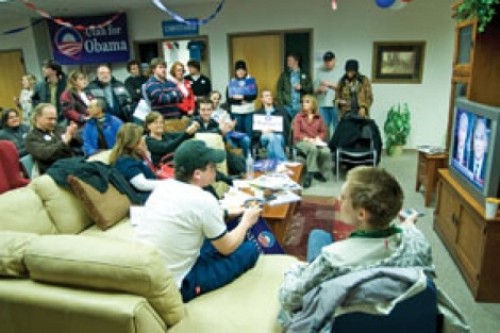Utah for Obama campaign headquarters easily could be overlooked. But the red and blue banners hanging outside give the place away. And just inside the doors stands the exuberant, if exhausted, campaign field director, Aaron Wiley.
Rubbing the wrinkles out of the Obama sticker proudly adhered to his warm-up jacket, Wiley leads the way through a scene of organizational chaos. Food wrappers litter countertops marked with rings from coffee cups; balloons, maps, and slogans adorn the gymnasium-like events room; and volunteers take a break from phone calls to discuss strategy and analyze poll results appearing on a monolithic big-screen television while seated on motel-caliber couches,
When asked how Barack Obama’s efforts in Utah differ from his Democratic rivals, Wiley, 24, pauses and looks almost confused. “What other candidates?” the 2007 University of Utah political-science graduate shoots back. “They haven’t done anything—there’s no other Democratic campaigns out here. They haven’t shown any sort of presence in Utah.”
Wiley’s energetic read on the situation is not entirely accurate. Hillary Clinton has organized an influential steering committee of Democrats, led by former state party chairman Donald Dunn. Candidate John Edwards has a presence in Utah. Until New Mexico Gov. Bill Richardson dropped out of the race last week, he counted at least two high-profile supporters: Salt Lake County Mayor Peter Corroon, Salt Lake City Mayor Ralph Becker and former Mayor Rocky Anderson
But Obama is the first Democratic candidate to open an official campaign headquarters behind the Zion Curtain.
Conventional political wisdom might ask why any candidate would spend time and money on a small state thrown among bigger players in the Feb. 5 Super Tuesday primaries and with little more than a prayer of Democratic victory in the general election.
It’s got something to do with wanting to be connected to a greater good.
Matt Burbank, associate professor of political science at the U., argues that “amateur activists, like what we have here in Utah, know they probably can’t win the state for a Democrat, so they are genuinely grass roots.”
Adds Tim Chambless, assistant professor of political science at the U: “In terms of a perceived grass-roots voter effort in Utah, supporters of Barack Obama are involved in an almost spontaneous groundswell of political energy for a candidate who is articulating a vision of a future America that is inclusive and united—not exclusionary and divided.”
Back in 1912, Indiana Sen. Albert Jeremiah Beveridge coined the term “grass roots” in a speech about his progressive party. Their movement, he said, originated “from the grass roots—it has grown from the soil of people’s hard necessities.”
Nearly 100 years later, the Obama campaign’s Wiley opines on his candidate’s ability to reach all demographics. “Whether you’re young or old, black or white, Republican, Democrat or Independent, he has something that appeals to everybody. And what really appeals is change—somebody who stands up for change.”
That word—change—has suddenly found its way into every candidate’s oratory. “Stand Up for Change” is Obama’s slogan—printed on widely scattered signs after his Iowa caucus victory and after his loss to Clinton in New Hampshire.
But it gets a little tricky when talking about specific changes for America. The Illinois senator has been criticized for failing to strongly and consistently oppose the war in Iraq and for a squishy position on fixing health care. Questions about his positions on illegal immigration, the economy and curbing global warming continue to dog him. It’s no small to-do list, but the next U.S. president must be prepared to adapt.
The Utah for Obama staff experienced a definite surge after the Iowa victory and a lag after the New Hampshire loss. Volunteers will continue to follow the upcoming too-close-to-call primaries in Nevada (Jan. 19) and South Carolina (Jan. 26). The Utah staff now numbers around 100 full- and part-time workers, Wiley says. Their energy is centered on Utah’s role in the 22-state primary on Feb. 5.
Until then, Obama volunteers—many of them college students—plan to hold “Got Vote?” educational sessions, caucus and primary watch parties, phone calling and Saturday open houses.
“Whatever happens, happens,” Wiley says. “But it is our immediate goal to win all of Utah’s Democratic delegate seats for Obama. With our supporters, it would take a lot for us to run out of gas.”
More by Devan Schwartz
-
News | Snow Fooling: Water czars predict our wet winter will trigger a faulty “drought rebound"
If you haven’t stored your skis or board for spring yet, no one will blame you. After all, this year’s snowfall has been off the charts. Most of this winter, storm fronts have rolled in from the Pacific with a nearly quotidian cadence. Alta...
- Mar 12, 2008
-
City Guide 2008 | Get Active: Ski & Board Resorts - Powder Play
Check out the 11 ski resorts we have up our sleeves.
- Feb 1, 2008
- More »




